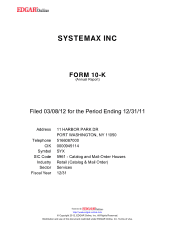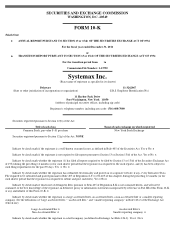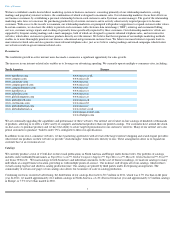CompUSA 2011 Annual Report Download - page 5
Download and view the complete annual report
Please find page 5 of the 2011 CompUSA annual report below. You can navigate through the pages in the report by either clicking on the pages listed below, or by using the keyword search tool below to find specific information within the annual report.
PART I
Unless otherwise indicated, all references herein to Systemax Inc. (sometimes referred to as “Systemax,” the “Company” or “we”) include its
subsidiaries.
Forward Looking Statements
This report contains forward looking statements within the meaning of that term in the Private Securities Litigation Reform Act of 1995 (Section 27A
of the Securities Act of 1933 and Section 21E of the Securities Exchange Act of 1934). Additional written or oral forward looking statements may be
made by the Company from time to time in filings with the Securities and Exchange Commission or otherwise. Statements contained in this report that
are not historical facts are forward looking statements made pursuant to the safe harbor provisions of the Private Securities Litigation Reform Act of
1995. Forward looking statements may include, but are not limited to, projections of revenue, income or loss and capital expenditures, statements
regarding future operations, financing needs, compliance with financial covenants in loan agreements, plans for acquisition or sale of assets or
businesses and consolidation of operations of newly acquired businesses, and plans relating to products or services of the Company, assessments of
materiality, predictions of future events and the effects of pending and possible litigation, as well as assumptions relating to the foregoing. In
addition, when used in this report, the words “anticipates,” “believes,” “estimates,” “expects,” “intends,” and “plans” and variations thereof and
similar expressions are intended to identify forward looking statements.
Forward looking statements are inherently subject to risks and uncertainties, some of which cannot be predicted or quantified based on current
expectations. Consequently, future events and results could differ materially from those set forth in, contemplated by, or underlying the forward
looking statements contained in this report. Statements in this report, particularly in “Item 1. Business,” “Item 1A. Risk Factors,” “Item 3. Legal
Proceedings,
” “Item 7. Management’s Discussion and Analysis of Financial Condition and Results of Operations,” and the Notes to Consolidated
Financial Statements describe certain factors, among others, that could contribute to or cause such differences.
Other factors that may affect our future results of operations and financial condition include, but are not limited to, unanticipated developments in any
one or more of the following areas, as well as other factors which may be detailed from time to time in our Securities and Exchange Commission
filings:
Readers are cautioned not to place undue reliance on any forward looking statements contained in this report, which speak only as of the date of this
report. We undertake no obligation to publicly release the result of any revisions to these forward looking statements that may be made to reflect
events or circumstances after the date hereof or to reflect the occurrence of unexpected events.
Table of Contents
•
risks involved with e
-
commerce, including possible loss of business and customer dissatisfaction if outages or other computer
-
related problems should preclude customer access to us
•
general economic conditions, such as decreased consumer confidence and spending, reductions in manufacturing capacity, and
inflation could result in our failure to achieve our historical sales growth rates and profit level
• the markets for our products and services are extremely competitive and if we are unable to successfully respond to our
competitors
’
strategies our sales and gross margins will be adversely affected
•
sales tax laws may be changed which could result in ecommerce and direct mail retailers having to collect sales taxes in states
where the current laws do not require us to do so
•
goodwill and intangible assets may become impaired resulting in a charge to earnings
• our substantial international operations are subject to risks such as fluctuations in currency rates, foreign regulatory requirements,
political uncertainty and the management of our growing international operations
• managing various inventory risks, such as being unable to profitably resell excess or obsolete inventory and/or the loss of product
return rights and price protection from our vendors
•
effective management of our rapid growth in retail stores in North America
•
meeting credit card industry compliance standards in order to maintain our ability to accept credit cards
•
significant changes in the computer products retail industry, especially relating to the distribution and sale of such products
•
timely availability of existing and new products
•
risks associated with delivery of merchandise to customers by utilizing common delivery services
•
the effect on us of volatility in the price of paper and periodic increases in postage rates
•
borrowing costs or availability
•
pending or threatened litigation and investigations
•
the availability of key personnel
•
the continuation of key vendor relationships
•
the operation of the Company
’
s management information systems
•
the ability to maintain satisfactory credit arrangements
3


















